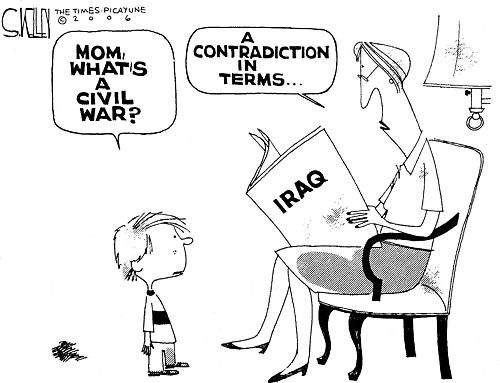What else could this month be about? How about bridging the gap? Ditching the divide? I am talking about the theological question: to Sunni or Shi'ia?
To make up a story about the divide would be more fathomable than the actuality. Then again since when is politics plausible? The abridged version of the Sunni vs Shi'ia divide would read as follows:- The good prophet Mohamed, died in 632 not having left any clear instructions regarding how his successor to lead the Ummuh (Muslim collective) would be chosen - other than those detailed in one of the revelations calling for election endorsed by consensus. This was clearly not clear enough. When Abu Bakr, the Prophet's father in law and confrere, was elected as his successor, a sudden resurgence of what could inevitably be under-described as gahaliya [unknowing/backwardness/irritability leading to violence/'my tribe is right!'] (Arabic is a language of context and nuance...) took place. The Prophet fought hard against this concept during his life time, advising his followers to not fall prey to this consensus. Contrary to popular belief the Prophet did not dictate the revelations to his followers; he questioned them as much as the next scholar would. Wisdom, he taught, would alleviate ignorance and abet the uprise of gahaliya. However, without leaving much in the way of a "Dummies Guide to Elections" it was only a matter of time before his efforts would become unravelled.
Abu Bakr was one of the first converts to Islam and the forefather of Sufism (another post...). He was a great believer in the Prophet's message and with his high status in society as a great tradesmen, he surrounded the Prophet with followers of equal importance to assist him in spreading his message of Islam. I am choosing my words carefully here. Note how I am not saying 'spreading Islam' but rather his message. This is on account of the fact that the revelations were bound into the Koran as we know it today after his death. Abu Bakr came to be the Caliph of the Message and was supported in his role as successor by most of the Prophet's following except the Prophet's son in law Ali Ibn Abu Talib. Ali was married to the Fatima, daughter of the Prophet and his first wife Khadija, who shortly died after her father's death. There were stories about Fatima being the one who pushed Ali to go against the decision of the Ummah to see Abu Bakr as successor. No one knows with certainty, but given that she died so soon after her father I am not sure how this story can hold up.
The likelihood is that, as with modern day politics, when a political vacuum is created, it’s never one person that scrambles alone to fill it. In this case the Prophet had indeed left a politico-religious vacuum that had to be filled as soon as it was created after his death in order to, amongst other things, safeguard the intricate web of alliances he had created with the tribes surrounding Mecca and Medina. In their bid for election Abu Bakr received the popular vote based on his experience, status and overall eligibility as the right hand to the Prophet; Ali's bid was more emotional claiming that the Prophet should be succeeded based on bloodline and given that he is the son-in-law, father of the Prophet's grandsons Hassan and Hussein, he should be the Caliph. Democracy vs Divine Ordinance. Tough choice.
So tough in fact that the fresh new Muslim Ummah divided itself already into Sunni - following Abu Bakr's decree as successor; and Shi'ia - receiving their go-no-go commands from Ali. However, Sunni Muslims still recognise Ali as the fourth Caliph as opposed to the Shi'ia belief that Ali is the first Caliph. This may be sufficient cause for rift. Not. In reality, at the time of the initial divide it was not as prominent as in modern day. It has been estimated that Shi'ias make up about 15% of the Muslim world. Pakistan, Lebanon and Iran hold the majority - Iran holding about 60 million. Iraq and Bahrain are a Shia-majority countries.
Is it necessary to say any more? I let the following images speak for themselves ...or through the words written on them. Indeed.





And we are back to where we started. As Ibn Khaldoun said - civilisations will heave and haul throughout a cycle untill some semblance of balance is restored. No we are not quite there yet.

No comments:
Post a Comment